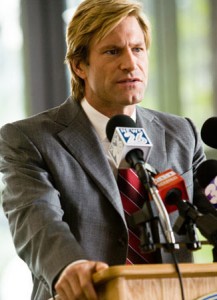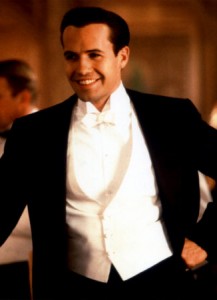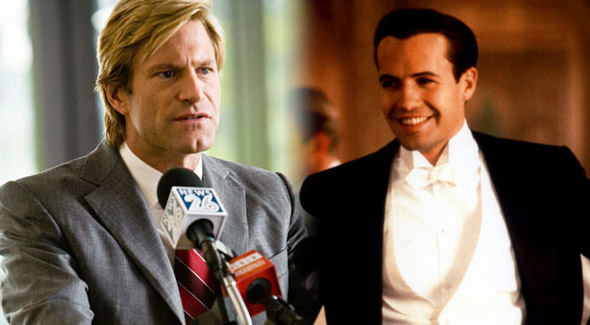 The Dark Knight is now the second-highest grossing film in Hollywood history, behind Titanic. In a lot of ways, these two movies are polar opposites. One’s a bittersweet historical romance. The other’s a punishingly bleak superhero sequel. But there’s one thing they share: a prominently featured line.
The Dark Knight is now the second-highest grossing film in Hollywood history, behind Titanic. In a lot of ways, these two movies are polar opposites. One’s a bittersweet historical romance. The other’s a punishingly bleak superhero sequel. But there’s one thing they share: a prominently featured line.
“I make my own luck.”
(Spoilers to follow.)
 In both movies, the line is paraphrased twice. It first appears early on, when a character introduces it as a personal motto. In The Dark Knight, it’s cocky District Attorney Harvey Dent, about to start a big trial. In Titanic, it’s Rose’s cocky fiancé Cal Hockley, responding to Jack Dawson’s tale of winning his ticket in a poker game. (His actual words are “A real man makes his own luck,” but it’s pretty clear who he thinks the real man is.)
In both movies, the line is paraphrased twice. It first appears early on, when a character introduces it as a personal motto. In The Dark Knight, it’s cocky District Attorney Harvey Dent, about to start a big trial. In Titanic, it’s Rose’s cocky fiancé Cal Hockley, responding to Jack Dawson’s tale of winning his ticket in a poker game. (His actual words are “A real man makes his own luck,” but it’s pretty clear who he thinks the real man is.)
The line returns later in both films, when it’s revealed that those characters aren’t playing fair. Rachel Dawes says “You make your own luck” when she realizes Harvey’s lucky coin has heads on both sides. Cal says “I make my own luck” as he stuffs his coat with cash, preparing to buy his way off the doomed boat.
Here are the four lines together:
http://www.youtube.com/watch?v=mlzFvX62dp8
Harvey and Cal share more than dialogue. They both start out their films as good guys. (Okay, Cal’s not exactly a “good guy,” but Rose is planning to marry him.) But after they lose their fiancés, they become the primary antagonists, trying to kill the people who once trusted them.
 More to the point, they’re both supremely confident men. Dent really believes he can single-handedly bring down the entire mafia, and Cal can’t imagine a universe that doesn’t revolve around him. “I make my own luck” is a reflection of their worldviews – they think they lead charmed lives. But of course, they both prove incapable of making their own luck, becoming victims of the Joker and Leonardo DiCaprio, respectively. And because they’re so self-confident, they react to misfortune with murderous rage.
More to the point, they’re both supremely confident men. Dent really believes he can single-handedly bring down the entire mafia, and Cal can’t imagine a universe that doesn’t revolve around him. “I make my own luck” is a reflection of their worldviews – they think they lead charmed lives. But of course, they both prove incapable of making their own luck, becoming victims of the Joker and Leonardo DiCaprio, respectively. And because they’re so self-confident, they react to misfortune with murderous rage.
The question is, did Dark Knight co-writer/director Christopher Nolan put this line in his film as an homage? Or is it just a coincidence? On the one hand, people were saying “I make my own luck” before Titanic. But on the other hand, the line’s become pretty well-associated with that movie in the past ten years. There was even an episode of The Office where Dwight declared, “‘A real man makes his own luck.’ Billy Zane, Titanic.”
Whether or not Nolan had Zane in mind, I wonder if “I make my own luck” is a sort of self-fulfilling prophesy. Put that line in your screenplay, guarantee yourself 500 mil domestic. We’ll see what happens the next time it shows up. Maybe it’s a lucky charm.

Seeing how integral the two-headed coin is to the character Harvey Dent, I can see it being a coincidence.
Considering this line is delivered by characters who wind up dead, I question its wisdom — and theirs.
The first time IMDb shows a variation of that line occurring is in the Gregory Peck war propaganda flick, Twelve O’Clock High (1949).
Personally, I don’t think of that line as being quite as prominent in Titanic. I thought that movie’s most prominent line was “I’m kind of the world!”
And if we’re talking world wide box office, the top two positions are held by Titanic and Return of the King. Both of which have Bernard Hill in them. So maybe he’s a lucky charm…
Interesting comparisons though (although I believe Harvey to be a much more fleshed out character than Cal).
whoops, make that “king” of the world :)
You forgot the biggest disparity between the two movies: One got its main intake from repeat viewings from teenage girls; the other from teenage boys (I’ll let you guess which is which).
Spot on for catching the coincidental line and to Becky for her ROTK notice. Would you like to see my script where Bernard Hill utters the “lucky line”? I wrote it for some teenagers.
“Considering this line is delivered by characters who wind up dead, I question its wisdom — and theirs.”
Actually, Dent is the one that dies, not Billy Zane’s character. Well, obviously Zane dies, but not on the ship.
Don’t disclose where you got those clips from. I’m claiming plausible deniability.
“But after they lose their fiancés, they become the primary antagonists, trying to kill the people who once trusted them.” Anyhoo, I think you’re a bit off on the relationship between Cal and Jack. It seems to me that Jack always knew Rose was unhappy with Cal, so he probably never trusted him at all. Jack could see right through Cal’s outward facade, and Cal knew it and resented it the whole time (plus the fact that he saw Jack as a threat to his position of power over Rose)- hence Cal’s attempts to sideswipe Jack so many times.
I do think another important difference to point out is the nature of the scene when each man says the line and whom they are speaking to. Both times, Harvey is talking to Rachel privately (although in public- side conversation) and trying to comfort/placate her in some fashion: first to reassure her that he’s not crazy, then to reassure her that he isn’t about to die. The first time it happens with Cal, he’s talking to two at once: the group at the table is meant to hear it, but it’s directed at Jack and is intended to insult him; the second time, he’s alone with his (crazy) man-servant, Lovejoy (terribly ironic name, eh? too bad he’s so unlike the B5 character he played in season one), and he’s talking about being underhanded and buying his way off of the sinking vessel. Further, I think it had already been clear that Cal had either fallen from grace or never was even there (which one is correct is debatable) by the time Cal says it the second time, whereas Harvey was still Harvey that second time. In other, more succinct, words, Harvey does it to be nice and Cal does it to be not-so-nice; Harvey does it for someone else’s sake, Cal does it for his own sake.
So maybe that’s why I cried when Harvey died but laughed when Old Rose said he “put a pistol in his mouth that year” or whatever the exact quote is. And maybe that has to do with the differences in how their deaths were treated: the (surviving) characters that knew and respected Harvey before he turned protected his reputation and/or mourned him; but those associated with Cal forgot about him (as far as we can tell).
I suppose one could probably write a full paper on the differences between the two characters, though. Even knowing the Batman mythos, Harvey’s transformation was still much more traumatic than Cal’s for me (and whether Cal even “transforms” versus “evolves” is, again, a debate in itself).
God, I write way too much every time…
Gab –
All good points. It’s true that when Harvey says the line, it’s kind of cute, and when Cal says it, you want him to drown. Certainly, I can’t claim that Cal and Harvey are two of a kind. Harvey’s a legitimately good man. Cal is a douche. (I’m a fan of Titanic, but subtlety is not one of its strong points – Cal is the bad guy, and James Cameron is not interested in making him remotely sympathetic.)
– Matt
I think you should also edit in Chigur (sp?) from No Country for Old Men, where the luck of others is decided based on coin flips.
I figured you might want to talk about the film where this line first appears. Gilda (1946).
http://www.youtube.com/watch?v=lH9Yv7TOH20 -2:22